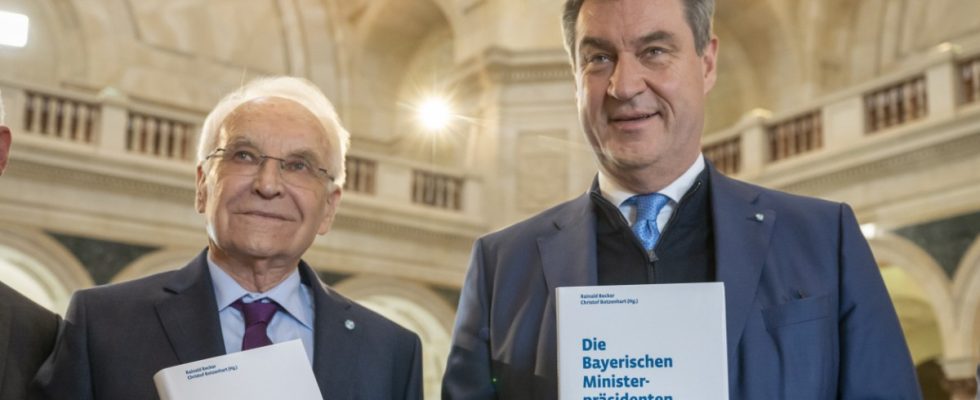Markus Söder should present a new book. Will he resist the temptation to talk primarily about himself? The fact that this temptation is great doesn’t just have to do with Söder himself, who is known to have an expansive ego. But also with the title of the book that he is presenting this Thursday in the domed hall of the State Chancellery: “The Bavarian Prime Ministers 1918-2018”. Söder’s speech will last half an hour. He will take a chronological ride through history, from Kurt Eisner to Horst Seehofer, and when he is through, Söder will tell the audience: “You can judge for yourself what happens after 2018.” He “won’t say anything” about his own role now.
The focus is on the other prime ministers, of whom only one came to the book launch: Edmund Stoiber. Günther Beckstein and Horst Seehofer are not there, the others have died. In the front rows sit their great-grandchildren, grandchildren or children, including Florian Streibl and Thomas Goppel, the sons of Prime Ministers Max Streibl and Alfons Goppel. Söder calls the latter “country grandpa” because Goppel was the first prime minister he met as a boy. Sometimes Söder sounds as if a family celebration is taking place here. He only acts as a party crasher once. He then reminds us that the transition from one prime minister to the next was “always associated with great drama” – because hardly any prime minister got the successor he himself would have wanted. “Most of the time, the predecessors warned about the successors.”
In any case, the story of the Bavarian Prime Minister is “great cinema,” says film lover Söder, and everyone has “achieved outstanding achievements.” It is well known that his personal heroes are Franz Josef Strauss and Edmund Stoiber. But on a day like this, everyone gets their due. Söder carefully avoids scandals, affairs or other mistakes. “A great man,” says the CSU leader about the Social Democrat Wilhelm Hoegner, who headed the Free State after the Second World War and again between 1954 and 1957. Seehofer, with whom Söder shares his personal drama, also did “very, very well”. It fits into the picture that on this decidedly harmonious day, two other major rivals sit next to each other in the audience without any fights breaking out: ex-Prime Minister Stoiber and the former CSU leader Theo Waigel.
Edmund Stoiber makes his appearance when his successor’s speech is over. There he sits on the podium with Söder and one of the book’s editors, the historian Rainald Becker. Stoiber sees the special status of a Bavarian Prime Minister in the fact that, unlike other country heads, the heads of state always received him when he traveled abroad. Markus Söder then emphasizes that the Bavarian one is “the largest state chancellery” and that the Zirbelstube on the fourth floor is a “myth”, just as Bavarian politics is shrouded in legend – and with it the office of Prime Minister.
Historian Becker then brings Söder and Stoiber back to earth a bit. In addition to cultural history, it was the economic boom after the Second World War that put Bavaria and its Prime Minister “into a leading position”https://www.sueddeutsche.de/bayern/.”There is almost nothing nicer” than being the Bavarian Prime Minister to be, says Söder on Thursday. Only almost? As Bavarian Prime Minister, you are “basically deported,” says Söder. And he immediately fuels the speculation about his chancellor ambitions in the next sentence: “Exceptions are theoretically conceivable.”

